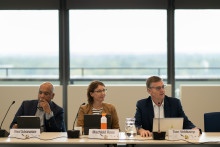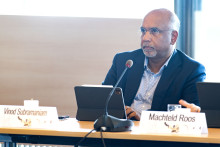A reorganisation, a disrupted relationship with superiors or a change of position: there are various reasons why UT employees may need to look for a new post within the university. But the guidance for these employees in finding a new post leaves much to be desired, said Dick Meijer (Party of the UT) Wednesday morning in the University Council. Moreover, when a such a situation leads to a conflict, the UT fails to live up to its own adage of ‘people first’. ‘Reluctant’ employees are isolated, given the blame, and are forced to take it or leave it.’
According to Meijer, the UT has a poor track record when it comes to court appearances. In the recent past, judges have frequently expressed their disdain for the way in which the university substantiates its legal decisions and carries out its documentation process, says the Council member. Meijer also criticises the role of the hired law firm Capra. The lawyers are said to use an ‘aggressive working method’ in conflict situations. ‘Unfortunately, they fully live up to their nickname: the pit bull of government and semi-government agencies.’
Advice
That is why the University Council advises the Executive Board to immediately discontinue its cooperation with Capra lawyers and to look for a law firm that matches its own adage of ‘people first’. The reassignment of employees who have been cast adrift also needs to be better organised, for example by communicating more transparently about vacancies within the organisation. Right now, employees are not given a fair chance to find a new position elsewhere within the university, says Meijer. According to the Council member, the unions and P-Nut (the PhD Network of the University of Twente) support the University Council's advice to the Executive Board.
It is not clear exactly how many conflict situations this concerns. The advice is based on recent, individual cases, writes the University Council. Therefore, better reporting on conflict situations, for example on the incurred legal costs, is required. In her response, Machteld Roos, Vice-President of the Executive Board, admitted that she had not yet been able to properly examine the letter due to its late arrival. She said she takes the signals ‘very seriously’. ‘We will take action, if necessary, because as a people first university, we want to do justice to our values.’






